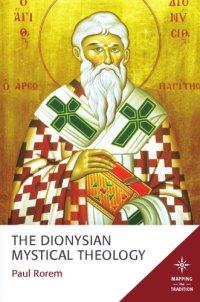
Ebook: The Dionysian mystical theology
Author: Erigena Johannes Scotus, of Saint-Victor Hugh, Bishop of Scythopolis John, Luther Martin, the Areopagite. Pseudo-Dionysius, the Areopagite Pseudo-Dionysius, Rorem Paul
- Tags: Influence (Literary artistic etc.), Negative theology--Christianity--History of doctrines, Pseudo-Dionysius -- the Areopagite, Pseudo-Dionysius -- the Areopagite -- Influence, Pseudo-Dionysius -- the Areopagite. -- Mystical theology, John -- Bishop of Scythopolis -- active 6th century, Erigena Johannes Scotus -- approximately 810-approximately 877, Hugh -- of Saint-Victor -- 1096?-1141, Luther Martin -- 1483-1546, Mystical theology (Pseudo-Dionysius the Areopagite), Negative theology -- Chri
- Series: Mapping the tradition
- Year: 2015
- Publisher: Fortress Press
- City: Minneapolis
- Language: English
- pdf
Part I. An introduction to Pseudo-Dionysius by way of The mystical theology -- Part II. Stages of Dionysian reception and interpretation. The doctrinal concerns of the first Dionysian scholiast, John of Scythopolis -- The early Latin Dionysius : Eriugena and Hugh of St. Victor -- Martin Luther's christocentric critique of Pseudo-Dionysian spirituality -- Negative theologies and the cross.;"The Dionysian Mystical Theology introduces the Pseudo-Dionysian 'mystical theology, ' with glimpses at key stages in its interpretation and critical reception through the centuries. In part one, the elusive Areopagite's own miniature essay, The Mystical Theology, is quoted in its entirety, sentence by sentence, with commentary. Its cryptic contents would be almost impenetrable without judicious reference to the rest of the Dionysian corpus: The Divine Names, The Celestial Hierarchy, The Ecclesiastical Hierarchy, and the ten Letters. Of special importance is the Dionysian use of negations in an "apophatic" theology that recognizes the transcendence of God beyond human words and concepts. Stages in the reception and critique of this Greek corpus and theme are sketched in part two: first, the initial sixth-century introduction and marginal comments (Scholia) by John of Scythopolis; second, the early Latin translation and commentary by the ninth-century Carolingian Eriugena and the twelfth-century commentary by the Parisian Hugh of St. Victor; and third, the critical reaction and opposition by Martin Luther in the Reformation. In conclusion, the Dionysian apophatic is presented alongside other forms of negative theology in light of modern and postmodern interests in the subject."--Publisher's website.
Download the book The Dionysian mystical theology for free or read online
Continue reading on any device:

Last viewed books
Related books
{related-news}
Comments (0)